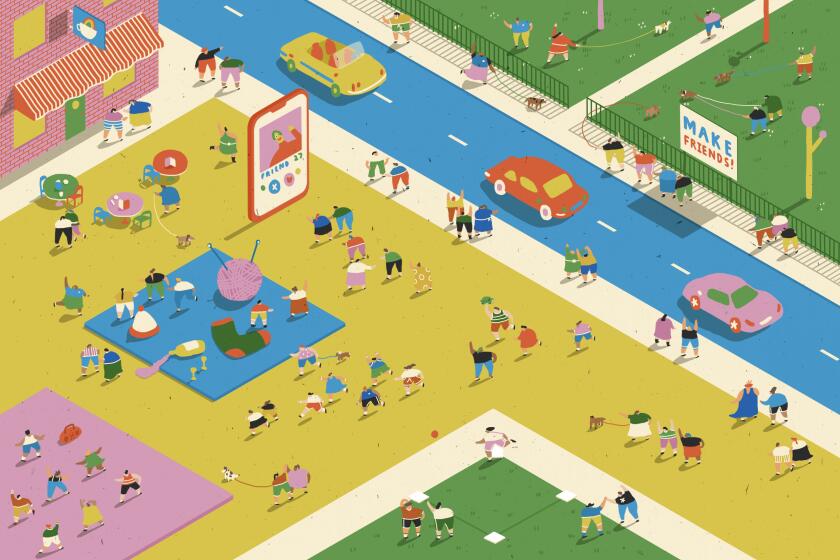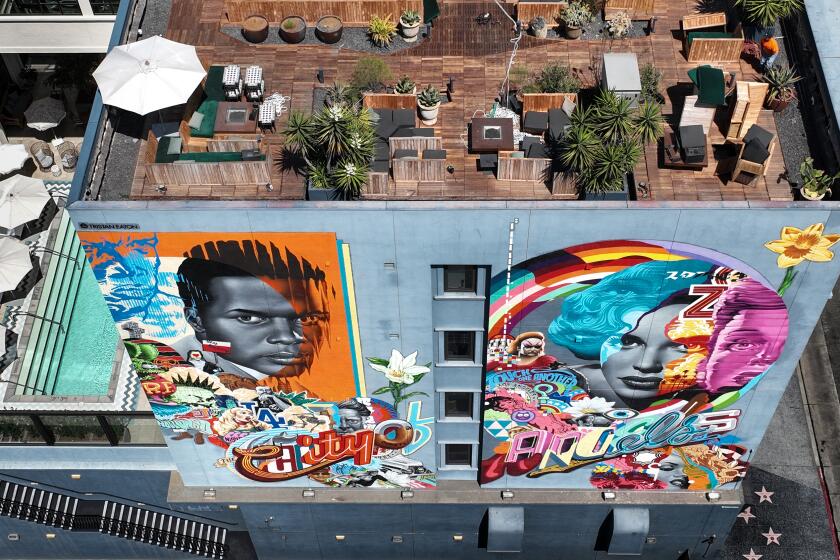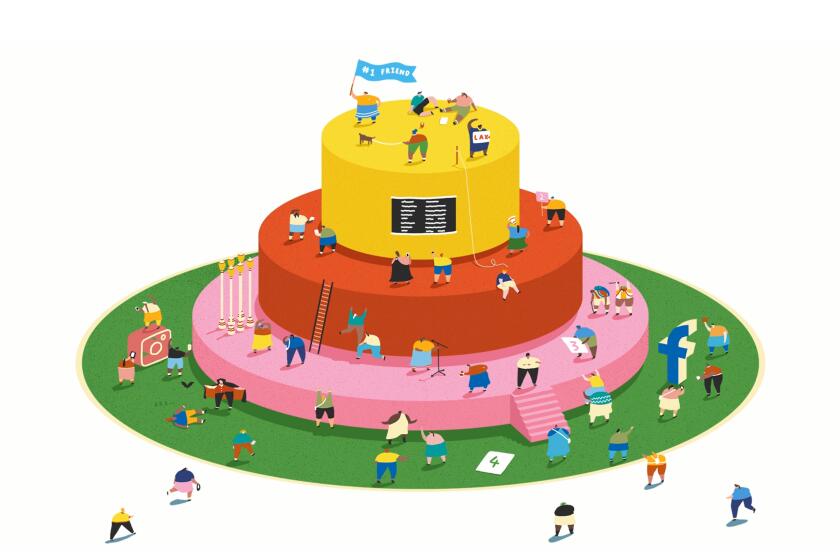Would you pay $200 a month to make friends in L.A.? You’ll need to get in line
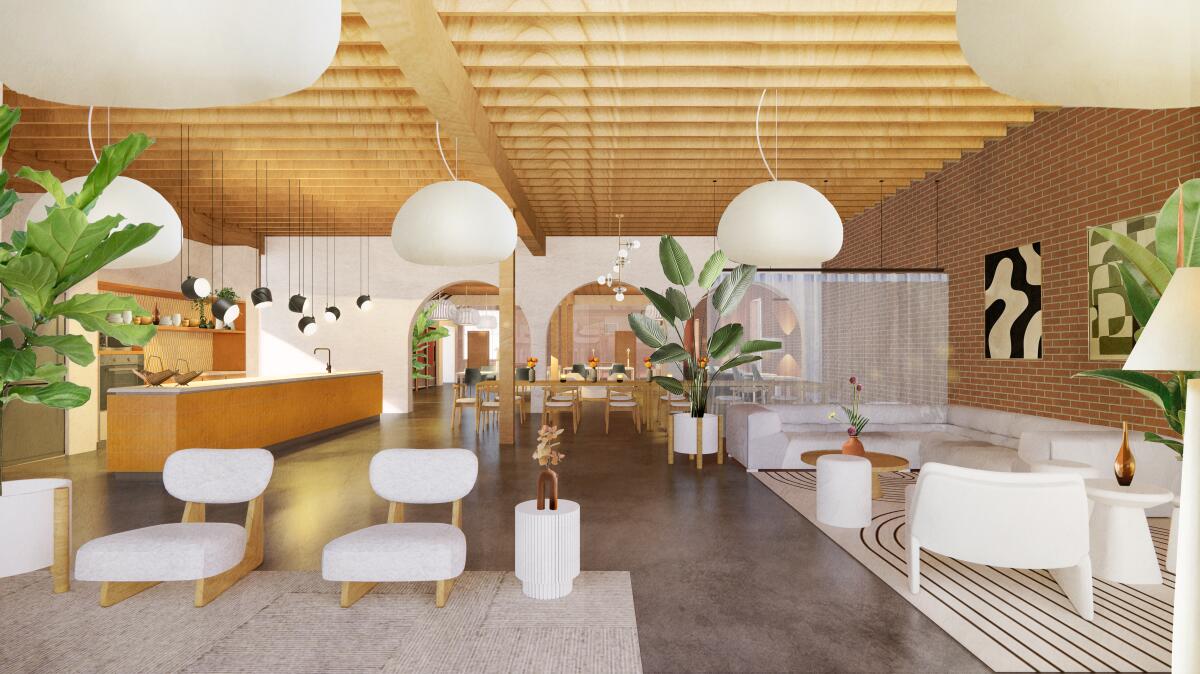
How do you make friends in L.A.?
It’s a city known to be notoriously lonely, one where the vastness constantly threatens to swallow you up. Newcomers and longtime residents alike struggle to find community in the endless sprawl.
You might try a church or a park, or if you’re brave enough, you could strike up a conversation with a stranger at the local coffee shop. Outside of work, however, the right circumstances for making friends can be particularly elusive, even for locals.
“Having a place that prioritizes making authentic connections is something that I’ve been missing,” said Evan O’Brien, who’s lived in L.A. for 13 years. He’s looking for a new third space — a place away from home or work, where he can just be among people.
That explains why on a cool Friday in October he’s mingling with strangers at a building that looks more like a construction site — an empty space devoid of any partitions with the windows taped over.
Dog parks, coffee shops, desert raves, breakfast meetups, community centers and hiking groups are keys to making friends in Los Angeles.
Groundfloor, a modern-day social club devoted to the purpose of making friends, will officially open its first Los Angeles location in January 2024 in Echo Park, but it’s already hosting events in its work-in-progress space to drum up membership interest. The San Francisco-based startup has three locations in the Bay Area with nearly 1,000 members.

Subscribers get exclusive access to this story
We’re offering L.A. Times subscribers special access to our best journalism. Thank you for your support.
Explore more Subscriber Exclusive content.
Loneliness and isolation have steadily increased since the 1970s, to the extent that the U.S. surgeon general has declared it an “epidemic” — one that must be treated as a public health crisis. In a 2021 survey, 12% of U.S. adults said they didn’t have any close friends, up from 3% in 1990.
It’s a health crisis because people lacking friendships are twice as likely to die prematurely, according to one study, a risk factor akin to the effects of smoking 20 cigarettes per day.
Social clubs have existed throughout history in various forms. The French salons of the 17th and 18th centuries, organized in private homes, gave women a chance to partake in the sharing of ideas about science, politics and art. The 18th century also gave rise to highly exclusive gentlemen’s clubs in London, where respectable men separated themselves from the riffraff. In the U.S., country clubs became popular in the 19th century, a reflection of affluent families moving to the suburbs.
Secretive members clubs became even more in demand during the pandemic with their promise of a full-lifestyle day-to-night experience that combines co-working and socializing under one stylish roof.
Los Angeles is no stranger to members-only clubs either. A recent wave of private clubs with swanky offerings and the allure of privacy have the city’s wealthy clamoring to join.
Groundfloor co-founder and Chief Executive Jamie Snedden said he hopes to take the “good parts” of these organized social gatherings and “lose some of the baggage” of exclusivity to build a social club open to everyone.
He came up with the idea when he moved to San Francisco from the U.K. in September 2021 as the city was still coming out of pandemic restrictions. While he worked from home, he was unable to make “meaningful connections” with new people, he said. With Groundfloor, he wanted to be intentional about creating an environment that’s tailored to how friendships have traditionally formed.
“You need to actually see the same person in the same environment multiple times or a number of weeks and months,” Snedden said. “You need to be sort of joined by a higher purpose of some description.”
The vast majority of friendships for people start in school or college, a place of worship, or an office, according to Snedden. Many adults, especially in the post-COVID era, no longer find themselves in environments with the right conditions for friendship, unless they intentionally seek them out.
Groundfloor’s event offerings and activities aim to provide those environments. They’re primarily member-led — club members can start sub-groups around different interests such as knitting or sports, and those leaders help plan events and have monthly leadership meetings with Groundfloor staff.
An exploration of friendship in Los Angeles, from guides on how to make friends and set boundaries to touching stories of people who stepped up.
Community is a “fragile thing,” Snedden said, which is why Groundfloor is careful to screen for potential bad actors or people with the wrong intentions. Every Groundfloor applicant gets a call from him or one of his co-founders to talk about why they want to join.
There’s one criterion: “Does this person have a real genuine desire to build community and find friendship?”
Eighty percent of people pass the screening, and are then given an invite code they can use when membership slots are released.
“We’re not in the business of making something super exclusive and ... fickle to obtain,” Snedden said.
You also need to be able to foot the $200 monthly membership fee, a hefty price to pay for friendship. But Snedden believes the number of amenities they’re able to provide — co-working space, fitness classes and curated events — makes the cost pencil out to be a pretty good deal.
In L.A., feeling lonely doesn’t have to be a bad thing. This list of curated experiences will help you hopefully see that, at least in this city, loneliness is nothing to fear.
A Soho House membership costs about $225 a month for one location or $413 for all locations with an introduction fee of $1,100 (those under the age of 27 get half off). A membership at NeueHouse, a creative industry and networking-oriented social club and co-working space, starts at $300 a month.
Groundfloor’s membership includes access to all current locations. The company also offers discounted memberships on a case-by-case basis for those who can’t afford the full amount, and club leaders can have their memberships reimbursed, Snedden said.
Rather than competing with Soho House or NeueHouse to offer professional networking opportunities and elevated amenities such as restaurants, global travel perks and extravagant event spaces, Snedden said he wants Groundfloor to give the experience of being in a community that is truly “authentic and member-led.” The hope is, when you run into other people at Groundfloor, they’re genuinely open to meeting you.
The demand is certainly there. Snedden said the first batch of 100 memberships for the Echo Park location sold out in 20 minutes in late September, and another batch of 100 filled up quickly last Friday (early members received a discount). There are 2,000 people on the waitlist for L.A., and about 10,000 nationally have signed up for expansion updates.
Investors seem to believe in it too, with Groundfloor raising $3 million in pre-seed funding from venture capital firms and individuals. It plans to open four more locations next year — at least two will be in Southern California.
From borrowed parking spots to pool pop-ins, not all friendships are created equal.
Los Angeles’ early members were invited to a Sofar Sounds concert featuring local artists Oct. 20 at Groundfloor’s unfinished space, sitting down in a room that will eventually become a yoga studio.
Kaylie Coleman, who lives in Koreatown and moved from Alabama four years ago, said she signed up to push herself to make friends, a task she’s found arduous in the time she’s been in the city.
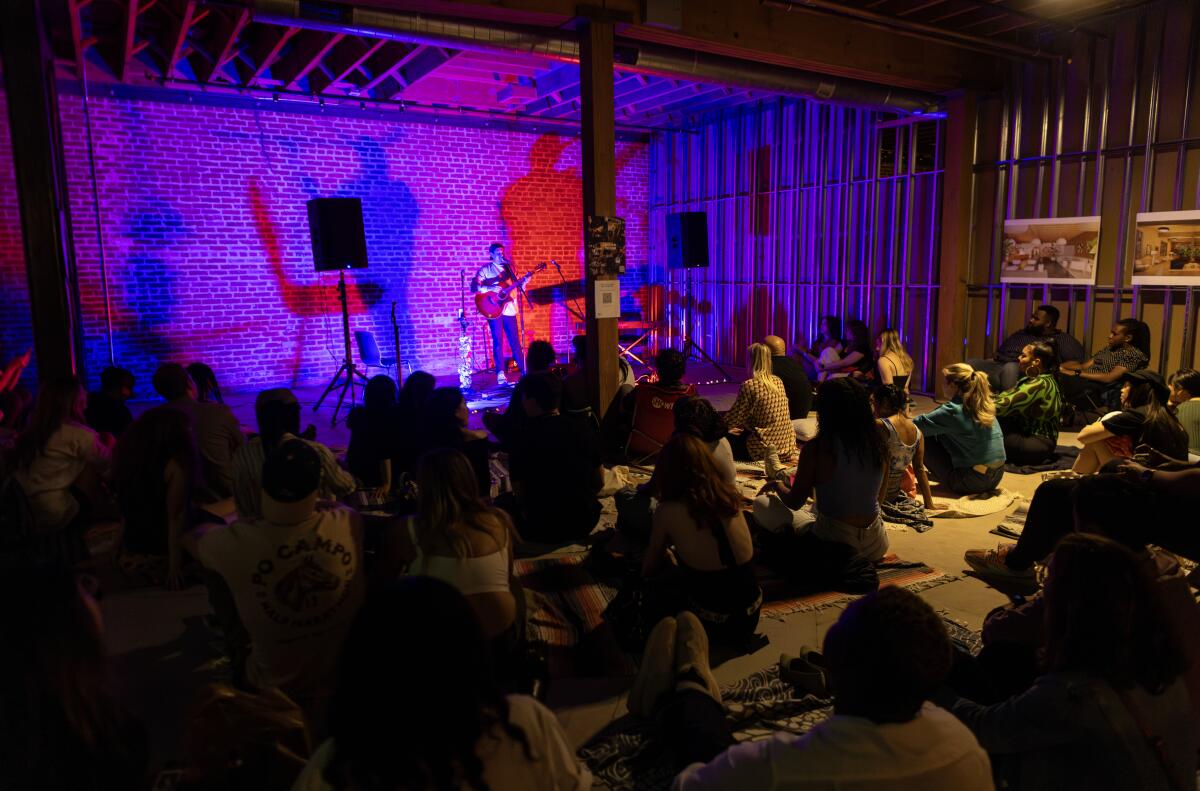
“I have social anxiety, [so] even this,” she gestures at the crowd, “is a little too much for me.”
Coleman, 25, is studying computer science at Los Angeles City College. Though she’s met some friends at school, she hopes that frequent interactions with people at Groundfloor will help her form connections more easily.
On the other end of the spectrum is Scott Klass, who’s lived in Los Angeles for 15 years since originally arriving to attend USC.
“I was intrigued to find more people who are interested in being part of the Echo Park community,” Klass, 38, said. He considers himself an extrovert and has made friends at places such as tiki bars, but is interested in having a new communal space for co-working.
“No one was going into the office even though I love going into the office,” said Klass, who works as a cartoon producer.
Jeffrey Hall, a professor of communication studies at the University of Kansas, called Groundfloor’s approach a “very traditional model of social behavior” compared with apps or online solutions to people’s social needs.
“It’s interesting to hear that people are not just looking at things that are modeling the success of online dating but instead thinking of these things as being issues that are a chance to renew in-person connection,” Hall said.
Readers are unimpressed by rich locals who spend thousands of dollars to hang out only with each other.
Even so, paid services like Groundfloor probably won’t be able to help the groups facing the brunt of the loneliness issue in the U.S., according to Hall, which are young adults and low-income adults.
It’s also unclear whether the social club model is financially viable. The Wing, a women-only social club and co-working space that opened in 2016 and reportedly had 12,000 members at its height, shut down at the end of 2022 after being pummeled financially by the pandemic. And Soho House, with three dozen houses around the world and more than 140,000 members, has yet to turn a profit after 27 years.
Some companies have approached solving the loneliness problem through curated living experiences aimed at young adults. Treehouse, which operates an apartment building in Hollywood, offers Sunday dinners and no shortage of shared spaces for residents to build community, including an art studio, library and cafe. But many of these have encountered problems as well — co-living startups Common and Bungalow have both faced a number of complaints over mismanagement, and WeWork has parted ways with its co-living venture WeLive.
Other groups in L.A. are trying to offer accessible members-only club experiences as well. The Social Club, which just began hosting events in April, currently has only 100 members and a few hundred on a waitlist. The club is in the process of finding a physical space, co-founder Julia Calaway said, and is tinkering with pricing structures to make memberships more affordable for a younger crowd.
The average age of a Groundfloor member is 33, and the San Francisco and Oakland locations are about 40% and 60% members of color respectively, according to Snedden.
Another benefit of having a social club beyond friendship making, according to University of Virginia psychology professor Adrienne Wood, is simply a physical space where you might encounter the same people frequently.
“These incidental everyday encounters with people that are either strangers or acquaintances … these are actually important for our well-being and our positive emotions, but also for a sense of community,” Wood said.
After the Echo Park concert, early members were hopeful that their monetary investments in this new community would eventually pay off.
O’Brien said the group chat on the Groundfloor app is abuzz with activity. He’s already gotten an invite to a “cinematic game day” featuring board games for movie lovers.
His fiancée is a member of Soho House, so he’s attended events there, but said it’s never felt like an environment for socializing or making connections to him.
“With Groundfloor, the place isn’t even built yet, and I have 12 people where I’m talking about grabbing lunch or whatever,” O’Brien said.
